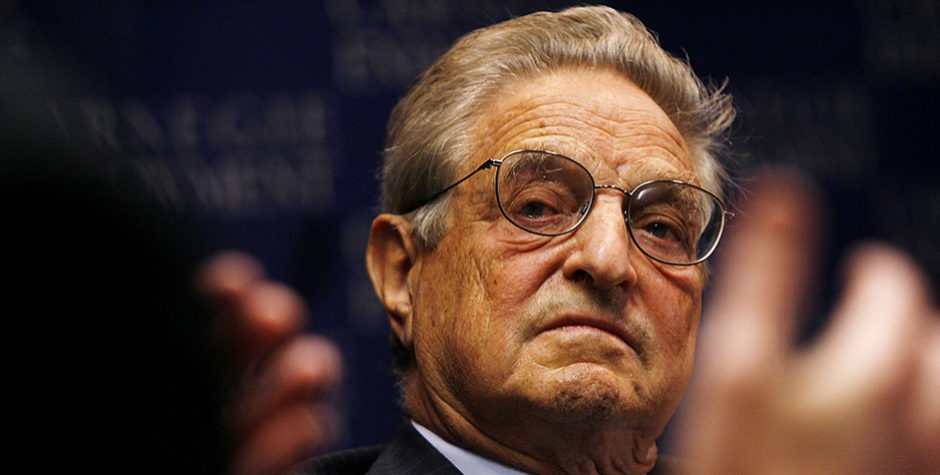Exposing Conflicts of Interest Between George Soros-Funded NGOs and Judges on the European Court of Human Rights – Part 3
ACLJ Note: The following report is the third and final in our three-part series by our European affiliate, the European Centre for Law and Justice (ECLJ), exposing the extreme bias of the judges of the European Court of Human Rights.
In the second installment , we discussed the case of Bulgarian judge Yonko Grosez who presided over cases involving NGOs that he had been a member of, and did not voluntarily withdraw, despite the clear question of impartiality.
Another problematic situation arises when former administrators of the far Left, George Soros-funded OSF sat in cases brought by one of the many NGOs financed by that same organization.
According to the OSF, the relationship established with its beneficiaries is not only financial but aims to establish “alliances in pursuing crucial parts of the open society agenda”. Such a relationship between a judge and a party, although indirect, may still understandably give the other party reason to fear a lack of impartiality.
It begs the question, why there are so few withdrawals in such cases? Indeed, in the past 10 years, out of the 313 withdrawals mentioned in the cases, only 12 occurred while the judges concerned were in relation with an NGO involved in the case. And the reasons for the withdrawals are never mentioned in the judgments; therefore, it is not possible to know (from the judgments) who asked for it, and why.
There are also only three mentions of unsuccessful requests of withdrawals, two formulated by the applicants and one by a State. It is not possible to know, without consulting the files directly, what procedure the Court applies to those demands, and if it justifies its decisions in this regard.
One reason for this small number of withdrawals lies in the fact that there is no formal withdrawal procedure within the European Court (ECtHR), unlike at the Court of Justice of the European Union (CJEU) (Article 38 of Protocol No 3 on the Statute of the CJEU). The Rules of the ECtHR only provide for the duty of a judge to withdraw, on his own initiative, in the case of doubt as to his independence or impartiality.
A “Resolution on Judicial Ethics” adopted by the European Court on June 23, 2008 somewhat clarifies the obligations of judges. It states that “In case of doubt as to application of these principles in a given situation, a judge may seek the advice of the President of the Court.” The European judge therefore has no obligation to inform its president. The document further adds that, “if necessary”, the president “may consult the Bureau” and “report to the Plenary Court on the application of these principles”.
This is a very light procedure which leaves it to the judge concerned to make the final decision on his withdrawal and to inform the President. However, the latter is entitled “exceptionally” to modify the composition of the sections “if circumstances so require” (Article 25 § 4 of the Rules of Court). This power is necessary, but it can only be exercised in a timely manner if the President is informed by the judges of the existence of situations likely to question their impartiality.
Another practical reason lies in the fact that the parties are almost never informed in advance of the composition of the Court that will rule on their case, unless there is a public hearing. Therefore, a party generally cannot effectively ask for the withdrawal of a judge. However, the fact that the parties did not ask for the recusal of the judge does not free him from the obligation to take himself the necessary measures, according to the Court’s case law (Škrlj v. Croatia, No 32953/13, 11 July 2019, § 45).
One last, more subjective reason may rely on the fact that the ECtHR and those Soros-funded NGOs share largely the same far Left value system, therefore, it may not be obvious to the concerned judges to see conflicts of interests with organizations having broadly the same interests.
As for the future, several measures could be implemented in order to remedy this situation, after what has been done in other European and national bodies, which are presented in the ECLJ report. The first step would be for the ECtHR to apply to itself the same rules it imposes on national jurisdictions, inter alia to formalize the procedures of withdrawal and recusal.
This would require establishing an obligation on the judges – not simply the option – to inform the President of the Court of any potential conflict of interest. The Court would also have the duty to justify its decisions to refuse a recusal, in accordance with the requirements of its own case-law (Harabin v. Slovakia, No 58688/11, 20 November 2012, §136
It remains to see what the ECtHR should do with its past most problematic judgments. According to its own case law, those cases should be judged again, following the example of the House of Lords in the Pinochet case. This should be the case especially if a party requests the revision of such judgment, according to rule 80 of the Rules of the Court.
We are now working to put this scandalous situation on the political agenda across Europe. We will continuously work to not only expose the extreme bias of the European Court of Human Rights’ judges, but also work to defeat their underlying far Left agenda.
Read the ECLJ’s full report, "NGOs and the Judges of the ECHR, 2009 –2019" here.
